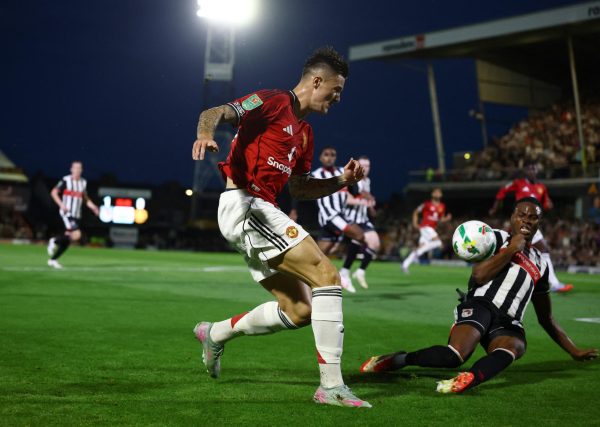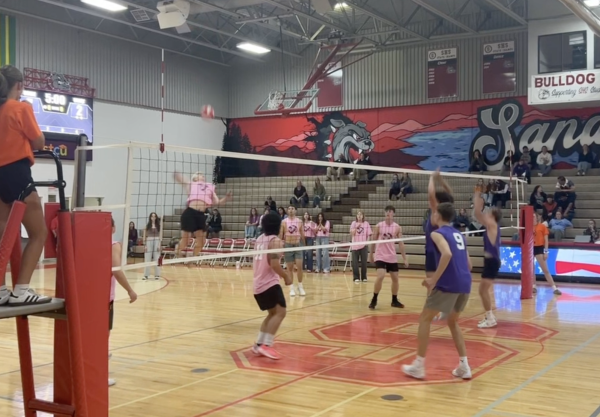WRESTLING THE SCALE
Competitive wrestlers take their sport to the next level to meet drastic dietary measures
When their sport calls for it, wrestlers all over the world sacrifice their everyday routines to meet extreme weight standards. Each season, a number of SHS wrestlers prepare to dedicate their time and energy to losing weight.
High school wrestling requires the athletes to weigh in an hour before every meet, and every day during a tournament, causing some athletes to cut weight in a weekly basis.
Wrestlers that choose to cut weight do so because they believe they can be more successful at a lower weight class.
Wrestlers cut weight by a variety of processes, some of which may be taking a large toll on their health. The most common ways an athlete cuts weight are working out in excessive amounts of clothing, spitting constantly, starvation, sitting in a sauna, taking diuretics such as caffeine pills or simply dieting.
“I usually work out a lot more,” sophomore Malachi Fleck said. “Sometimes in like three sweatshirts, and sweats.”
Some of these strategies are illegal by high school wrestling guidelines, and others are just not suggested by coaches.
Athletes can not work out in materials that don’t allow any oxygen in, such as plastic bags or rubber suits. Other strategies such as spitting, starvation, not drinking water or long periods of time in a sauna are not technically illegal but are strongly discouraged by coaches.
“The right way to cut weight is to do it slowly, by working out a lot and eating the right foods,” head coach Jake Stark said. “I always tell my guys, ‘If you worried about wrestling as much as you worried about cutting weight, you’d be a really good wrestler.’”
Nonetheless, many wrestlers choose the unhealthy route to cut weight for efficiency. Some wrestlers at SHS cut weight during the season by sitting in a sauna for up to an hour and a half, or working out while layered in sweatshirts and sweatpants, while others don’t eat or drink water during the day.
“A lot of wrestlers choose to cut weight illegally because you can cut a lot of weight fast,” junior Mason Bangeman said.
National high school wrestling requires that every athlete has at least 7% body fat to be able to wrestle. If an athlete’s body fat percentage is lower than 7 percent, this signifies that they are unhealthy and they will be disqualified until it is raised.
Sophomore Jake Ryan is one of the many who endure the process of dropping weight in order to be more successful in his sport, and he believes it doesn’t affect his wrestling negatively.
“I spit, I don’t eat dinner, I don’t eat all day, I sweat [excessively], and I don’t drink water,” Ryan said. “That way I feel bigger than the other people in the weight class.”
There are different opinions within the team about cutting weight, so many wrestlers prefer to stay at their regular weight.
Junior Ryan McNelley chooses not to cut weight because of the dangers and struggles it may present.
“I feel like if you drop weight it affects your wrestling,” McNelley said. “You’re tired, you don’t feel good, and once you drop all that weight it’s not healthy for your body.”
The process of dropping weight may increase a wrestler’s statistics and success in a season, but because of the threats it may pose, many wonder if it’s really worth it.
Research shows that cutting weight can be very dangerous to one’s health because of dehydration, lack of nutrition, and an unnatural amount of weight loss within a certain time.
Bangeman is also one of the wrestlers who choose to cut weight throughout the season.
Although cutting this weight is exhausting, Bangeman’s commitment to wrestling drives him to do it.
“It’s just terrible; you feel like crap, and you have no energy,” Bangeman said. “The first five to four pounds are easier and then last two pounds are the hardest.”
In this aspect of the sport, coaches monitor wrestlers’ weights, while doing their best to keep athletes from utilizing dangerous strategies.
However, it is impossible for a coach to monitor the wrestlers 24/7, resulting in illegal weight cutting.
“[If I caught my wrestlers cutting weight in unhealthy ways] I would just tell them that they can’t wrestle at that weight,” Stark said. “This is a non negotiable item, and you have to wrestle a weight up because you’re not doing it the right way.”
There is also online software that takes each wrestler’s information and tracks their weight throughout the season, telling them how much they are allowed to lose to stay within the requirements.
Athletes may sacrifice in order to be successful in their sports, but when wrestlers sacrifice food, water and a healthy lifestyle, dangers may arise.

Jezza Hutto is a senior and it is her second year on staff. Here are some fun facts about Jezza.
What are you freakishly good at?
I'm freakishly...





